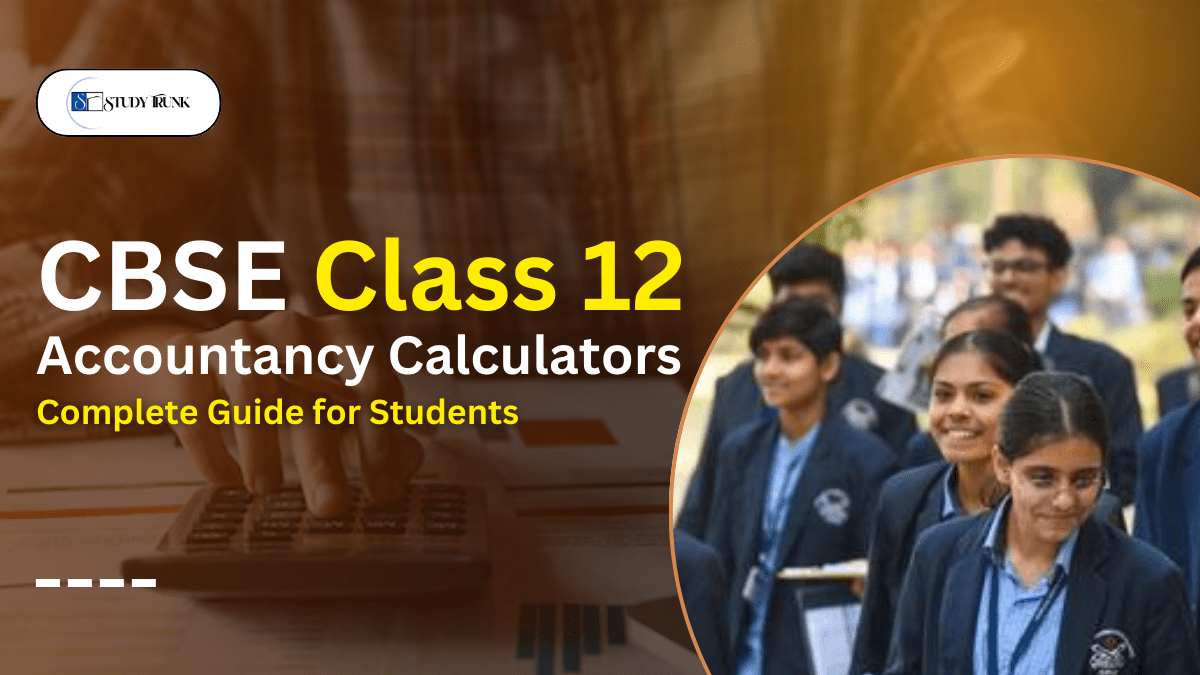Are you searching for the best CBSE Class 12 Accountancy Calculators? You’re in good company! Accountancy in Class 12 is packed with calculations whether it’s journal entries, crafting financial statements, dealing with depreciation, goodwill, or cash flow statements. These subjects can often seem daunting because of the complex numbers involved. That’s why so many students are curious: Can we use an accounting calculator in CBSE exams? In this guide, we’ll break down the rules about using calculators in CBSE Class 12 Accountancy exams and share some of the best tools you can practice with at home. This will make your study sessions smoother, faster, and more accurate.
Can You Use Calculators in CBSE Class 12 Accountancy Exams?
The simple answer is No. According to official CBSE guidelines, CBSE Class 12 Accountancy calculators are not allowed during board exams. This rule ensures students enhance their mental math skills and get used to solving financial problems manually.
Why Are Calculators Not Allowed in CBSE Exams?
While you can’t use a CBSE Class 12 Accountancy Calculators in exams, you can definitely use them for practice and learning at home.
- To build strong mental calculation skills.
- To maintain fairness in the examination process.
- To prevent misuse of programmable calculators.
- To prepare students for professional courses like CA, CS, and CMA where manual calculation is essential.
Important Calculations in CBSE Class 12 Accountancy
Understanding these calculations in CBSE Class 12 Accountancy is vital, as it not only prepares you for exams but also sets you up for success in higher education in commerce and finance. In Class 12, accountancy focuses on numbers, adjustments, and accuracy. To score high, you need to be comfortable with these crucial calculations.
- Journal Entries – Recording business transactions in the correct debit and credit format.
- Ledger Posting & Balancing – Transferring entries into ledgers and balancing accounts.
- Depreciation – Calculating depreciation using methods like Straight Line Method (SLM) and Written Down Value (WDV).
- Goodwill Valuation – Finding goodwill through Average Profit Method, Super Profit Method, and Capitalization Method.
- Admission, Retirement & Death of a Partner – Adjustments in capital accounts, revaluation of assets, and goodwill treatment.
- Share Capital & Debentures – Issuing, redeeming, and accounting for shares and debentures.
- Financial Statements – Preparing the Trading Account, Profit & Loss Account, and Balance Sheet.
- Cash Flow Statement – Analyzing cash inflows and outflows from operating, investing, and financing activities.
- Ratios – Calculating profitability, liquidity, solvency, and activity ratios for analysis.
Best CBSE Class 12 Accountancy Calculators Tools for Practice
While CBSE doesn’t allow calculators in exams, you can use the following tools at home to practice efficiently and improve speed:
1. Accounting Calculator Apps for CBSE Students
- Financial Calculator (Android/iOS): Handles interest, depreciation, and financial ratios.
- RealCalc Scientific Calculator: Useful for percentages and log calculations.
- CASIO Calculator App: Replicates the experience of a real scientific calculator.
2. Online CBSE Accountancy Calculators
- Depreciation Calculator: Websites like CalculatorSoup or Omni Calculator offer easy-to-use depreciation tools.
- Goodwill Valuation Calculator: Practice with Average and Super Profit methods.
- Cash Flow Calculator: Understand how changes in cash inflows and outflows impact financial statements.
3. Microsoft Excel & Google Sheets
- Excel Formulas like SUM, AVERAGE, FV, PV, and PMT are helpful in solving real-time accounting questions.
- Google Sheets can be used to automate balance sheets, ratio analysis, and more.
| Important Posts for You | |
| IIT Online Course | CBSE Result |
| Top Career Options After 12th | PGDM vs MBA |
| What is the Factorial 100 | CGPET Exam |
| Online Education Advantages and Disadvantages | After MBA |
Tips to Improve Accounting Calculations Without a Calculator
Since CBSE doesn’t allow calculators in the Class 12 Accountancy exam, you need to be confident with manual calculations. Here are some useful tips:
- Practice Daily with Numbers: Solve a few journal entries, depreciation sums, or ratio questions every day. Regular practice builds speed and reduces silly mistakes.
- Memorize Key Formulas: Keep a small notebook of important formulas (Depreciation, Goodwill, Ratios, Cash Flow). Revising them often helps you recall instantly during exams.
- Work on Approximation Skills: Try estimating answers quickly before doing the full calculation. This helps in spotting errors if your final answer looks “off.”
- Use Shortcuts for Multiplication & Division: Learn basic mental math tricks (like breaking numbers into parts: 48 × 25 = (50 × 25) – (2 × 25)). Saves time in lengthy balance sheet totals.
- Neat & Organized Working Notes: Write step-by-step calculations clearly in the margin. This avoids confusion and helps fetch marks even if the final answer is wrong.
- Focus on Accuracy First, Speed Later: Don’t rush in the beginning. Build accuracy, then speed will follow naturally with practice.
- Practice Previous Year Papers: Solve at least 5–10 past papers under timed conditions. This improves both speed and confidence before the actual exam.
Common Challenges in CBSE Class 12 Accountancy Calculators (And Solutions)
1. Struggling with Ratio Analysis?
Solution: Understand formula logic with examples instead of rote learning.
2. Making Errors in Goodwill Valuation?
Solution: Break the question into steps and cross-verify the final answer.
3. Confused Between Depreciation Methods?
Solution: Solve 2–3 problems using both methods to understand their application.
4. Cash Flow Statement Seems Tough?
Solution: Divide it into operating, investing, and financing sections clearly.
How to Score High in CBSE Class 12 Accountancy Exam?
Scoring high in Accountancy isn’t merely about solving equations it’s really about how you prepare and showcase your work. Check out these reliable tips to help you improve your grades: Even without a calculator, here’s how to stay ahead:
- Understand the Concepts: Read the NCERT thoroughly and understand the logic behind every calculation.
- Practice Every Day: Solve numerical problems, worksheets, and model question papers.
- Use Digital Tools Wisely: Practice with accountancy calculator CBSE class 12 tools for better accuracy at home.
- Make Revision Notes: Create a formula book or handwritten notes to revise quickly before exams.
- Focus on High-Weightage Topics: Company Accounts, Partnership Accounts, and Cash Flow Statements usually carry more marks.
| University | Distance |
| Allahabad University Online | |
| Amity University Online | |
| Jiwaji University MP Online | |
| Chandigarh University Online | |
| Shivaji University Online | |
| Cheapest Online MBA | |
| HNBGU Admission |
CBSE Class 12 Accountancy Calculators FAQs
- Q1. Is calculator allowed in CBSE Class 12 board exam 2026?
No, calculators are not allowed in CBSE Class 12 board exams, including Accountancy and other subjects. - Q2. Is calculator allowed in CBSE Class 12 Science?
No, calculators are not permitted in Class 12 Science exams like Physics, Chemistry, or Mathematics. Students must do calculations manually. - Q3. Can I use Excel or online accounting calculators while studying?
Yes, these are great tools to help you understand concepts and speed up your practice. - Q4. What is the best accounting calculator for CBSE students?
Apps like Financial Calculator and online tools from CalculatorSoup are excellent for practice. -
Is calculator allowed in CBSE Class 12 Commerce?
No, calculators are not allowed in CBSE Class 12 Commerce exams (Accountancy, Business Studies, Economics, etc.). All calculations must be done manually.

